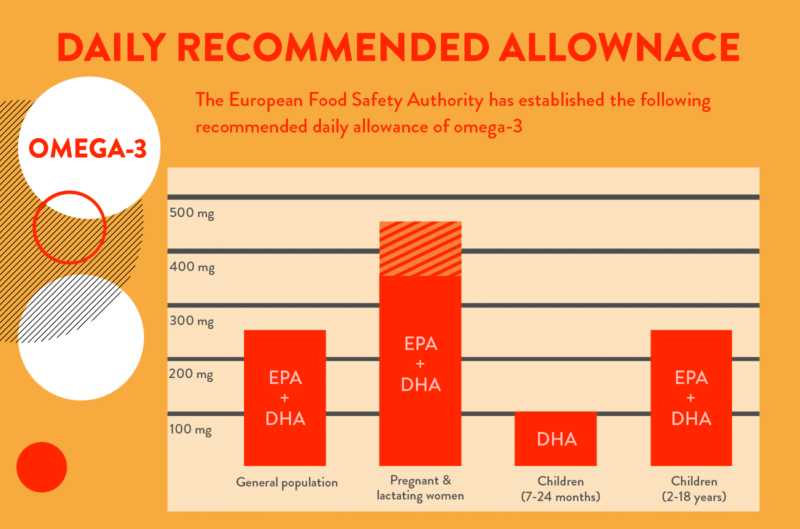Most of us know the importance of a healthy diet during pregnancy and that there is an increased need for certain nutrients such as iron, vitamin D and omega-3 (I’ve previously written about the importance of iron during pregnancy) in supporting both mum and baby to have a healthy pregnancy.
Through scientific research, it is understood that this is not just to sustain a healthy pregnancy, but can lay the foundations for the positive healthy outcomes of the baby throughout their lifespan.

Omega-3 fish oil can lay the foundations for the positive healthy outcomes of the baby throughout their lifespan.
So what is omega-3?
Omega 3’s are a family of long-chain polyunsaturated fatty acids including DHA (docosahexaenoic acid) and EPA (eicosapentaenoic acid). Basically, they are part of the family of ‘good fats’. They are essential for our bodies and contribute to the normal function of the heart* as well as the maintenance of normal blood cholesterol levels**. Our bodies cannot produce their own omega-3 fatty acids during pregnancy, so they must be taken through the diet or via taking an omega-3 supplement or fish oil.
The importance of omega-3 fish oil/ DHA in pregnancy
Over the last number of years, research has found that omega-3, (in particular DHA) has huge ranging functions within our bodies and that of the growing foetus. They contribute to the normal function of the heart as well as the maintenance of normal blood cholesterol levels. During pregnancy, DHA acts as a vital building block and contributes to the normal brain and eye development of the foetus. The increased need for these substances means that it can be very difficult to get enough through diet alone.

During pregnancy DHA acts as a vital building block, and contributes to the normal brain and eye development of the foetus.
Benefits of fish oil omega-3 In pregnancy
Research has shown that taking the right amount of omega-3 brings health benefits in supporting normal brain and eye development of the foetus. Taking fish oil supplements in pregnancy may also have enormous long-term impact on children – a recent study¹ showed that women who took a fish oil supplement in pregnancy had healthier children right up until the 6th year after birth. The children had stronger bones and muscle mass and lower rates of obesity. Omega-3 is also really important in the production of breast milk postnatally.
How much omega-3 fish oil should a pregnant women take?
The beneficial effect of omega-3 is obtained with a daily intake of 200 mg of DHA in addition to the recommended daily intake for omega-3 fatty acids for adults, i.e. 250 mg DHA and EPA. Active Iron Pregnancy Plus has 300mg of omega-3 including 250mg of DHA and 50mg of EPA.
Below is a quick reference to the recommended intake:
The European Food Safety Authority has established the following recommended daily allowance:
General population:
250mg EPA+DHA/day
Pregnant & lactating women:
350-450 mg EPA+DHA/day
Children (7-24 months):
100mg DHA/day
Children (2-18 years):
250mg EPA+DHA/day

Daily recommendation of Omega-3 fish oil by the European Food Safety Authority
What foods contain omega-3 fish oils, suitable to eat in pregnancy?
Fish, as the name suggests, is the best source of omega-3 – particularly cold water fish such as salmon, tuna, sardines, anchovies and herring. However, in pregnancy we are cognisant of the amount of mercury in fish which is higher in the types of fish that contain plenty of omega-3. Pregnant women should have no more that 1-2 portions of fish a week. Other sources are nuts & seeds (such as flaxseed, chia seeds, and walnuts), plant oils (such as flaxseed oil, soybean oil, and canola oil) and fortified foods (such as certain brands of eggs, yogurt, juices, milk, soy beverages).
How to get omega-3 fish oils if you don’t like eating fish?
Very simply by taking a supplement! They don’t taste ‘fishy’, and it means you get all the goodness of omega-3 without the fish. As I mentioned, you can get omega-3 from other dietary sources which then can be converted by the body, but it can be still be difficult to obtain enough from these sources–particularly during the added requirements of pregnancy.

Taking supplements are a great way to get your recommended intake of omega-3, especially if you don’t enjoy the taste of fish.
What should I look for in an omega-3 supplement while pregnant?
During pregnancy, you should aim to get an omega-3 supplement with the recommend amount of omega-3 (minimum 200mg DHA), with both DHA and EPA fatty acids. Check that they are from a reputable company that is transparent about what exactly is in the supplement. It’s also really important to avoid taking an omega-3 supplement that contains cod liver oil, which can contain high levels of Vitamin A which is unsafe in pregnancy. Talking to your pharmacist is a great way to be guided.
As midwife, I recommend taking Active Iron Pregnancy Plus, which contains a capsule of sustainably sourced omega-3 fish oil, as well as a capsule containing 25mg of Active Iron, and a multivitamin with Active Folic and vitamin D. Everything you need in one packet!
Conclusion: omega-3 fish oil and pregnancy
It can’t be overstated just how important omega-3 fish oils are in pregnancy. Your growing baby only gets what they need from you, so taking omega-3 though supplements can be great way to optimise a healthy pregnancy. Taking prenatal omega-3 DHA and EPA contributes to the normal brain and eye development of the foetus

* EPA and DHA contribute to the normal function of the heart.
**ALA contributes to the maintenance of normal blood cholesterol levels.
1: Vinding RK, Stokholm J, Sevelsted A, Sejersen T, Chawes BL, Bønnelykke K, Thorsen J, Howe LD, Krakauer M, Bisgaard H. Effect of fish oil supplementation in pregnancy on bone, lean, and fat mass at six years: randomised clinical trial. BMJ. 2018 Sep 4;362:k3312. doi: 10.1136/bmj.k3312. PMID: 30181143; PMCID: PMC6122120.
Some other good sources for further information:
American Pregnancy – Omega-3 fish oil
Fish oil pills during pregnancy may mean stronger kids

